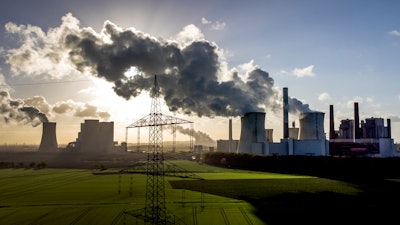
WASHINGTON (AP) — Oil and gas producers talk up technological breakthroughs they say will soon allow the world to drill and burn fossil fuels without worsening global warming. U.S. climate envoy John Kerry says the time is here for the industry to prove it can make the technology happen — at scale, affordably and quickly — to stave off climate disaster.
And Kerry says he has "serious questions" whether it can.
Kerry's comments came in an interview with The Associated Press on one of the most crucial topics in the fight to slow global warming: the argument from oil and gas producers that they will soon have technology in place to extract the climate-damaging gases that make fossil fuels the main culprit in climate change, allowing companies to keep pumping crude and natural gas worry-free.
Kerry said the ideal solution is a fast global switch to renewable energy, but oil and gas states and companies have a right to give their claim of technological rescue a try.
"If you're able to abate the emissions, capture it," Kerry said this past week at his climate team's offices at the State Department. "But we don't have that at-scale yet. And we can't sit here and just pretend we're going to automatically have something we don't have today. Because we might not. It might not work."
Globally, the point matters because oil and gas companies point to the hope of technology that can one day scour away most of the climate-wrecking carbon to stave off public and government pressure for the world to pivot faster away from fossil fuels and to solar, wind and other cleaner energy.
"What they're banking on is that they're going to be able to do the emissions capture," Kerry said of oil and gas companies. He ticked off the stages of operations that would involve.
"If you can do those things, you may be able to make it economically competitive," he said, adding, "I have some serious questions about whether it will be price-competitive."
Especially since 2015, when the United States and nearly 200 other governments committed to cut emissions to avoid the most disastrous scenarios of global warming, oil producers have spent hundreds of millions of dollars in public campaigns portraying themselves as climate-friendly. Industry ads and social media campaigns often suggest the carbon-purging technology is already on the job, extracting the climate-damaging gases from oil and gas facilities' around the world.
"CO2 capture and transportation technologies have been operating safely across the globe and in the US for many years," the website of oil giant BP says.
"Technologies capture CO2 emissions at source or directly from the air," Saudi state oil giant Aramco says, describing the carbon then being stored safely underground or turned into "useful products."
In reality, the technology to capture one major climate-damaging gas, methane, from oil and gas operations does exist, and is awaiting investment to roll out at scale. But the technology to capture the biggest climate agent, carbon dioxide, remains limited in scale and costly, and often energy-intensive in its own right.
The International Energy Agency, some national governments globally, and many climate scientists and advocates are adamant that while carbon-capturing technology will play a role, oil and gas production itself must be phased out.
"Actual experience has been that commercial-scale carbon capture projects have fallen far, far short of the claims," said David Schlissel of the Institute for Energy Economics and Financial Analysis research group.
"I just think it's foolish to think that we can keep pumping the stuff, CO2, methane, into the atmosphere, and that at some point we'll be able to capture it," Schlissel said.
The American Petroleum Institute trade group declined comment on whether the industry could show it was ready to bring carbon-capture technology fully online quickly enough and affordably enough.
In a statement, the group said "API supports federal policies to achieve" commercial carbon capture efforts and bring them fully online. It pointed to a 2019 industry-backed report calling for heavy government funding to capture a quarter of current greenhouse gases within 15 years.
The fight — fast production cuts versus technological rescue — promises to come to a head this year.
Annual U.N.-sponsored climate talks meant to help keep countries on track to meet their pledges to cut emissions are being held this year in the United Arab Emirates.
The talks will be hosted by Sultan al-Jaber, the chief executive officer of the Emirates' state oil company. Like the U.S. and several other countries, the Gulf nation is expanding drilling even as it champions the climate cause.
Going into November's climate talks, al-Jaber is calling for a phase-out of ''fossil fuel emissions," leaving it ambiguous whether he means a ramping up of technology or is open to some production cuts.
At the 2021 U.N. climate talks in Scotland, countries for the first time agreed to phase down the global use of coal. Talks the next year in Egypt saw a major push for a commitment to phase out oil and gas, but it failed.
While nonbinding, any agreement out of this year's climate talks that the world should start phasing out oil and gas production would be a first. It would put governments and the industry on the spot to comply.
Kerry rejected the idea of putting a deadline on phasing out oil and gas production. How fast that can happen depends partly on how fast the world moves to electric vehicles and renewable-fueled power grids, he said.
Instead, he said, this year's climate talks will "quite possibly" produce an international agreement to phase out the use of "unabated" oil and natural gas, meaning oil and gas where the carbon emissions are not captured. This could disappoint those calling for fast cuts in oil and gas production.
Kerry said the deadline to watch is 2030. By then, the U.N.'s top climate panel says, the world will need to have nearly halved climate-damaging emissions to stave off the more devastating scenarios of global warming.
"We can't let the wish or the hope govern common sense here," Kerry said. "If we know that we can get the job done by deploying more renewables and current technology, we ought to be doing that."
__
This story was first published on May 14, 2023. It was updated on May 17, 2023, to fix the position of clarifying note that made clear the American Petroleum Institute was declining comment on how quickly carbon capture technology would be ready and to clarify its position on supporting federal policies.






















